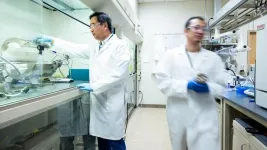(Press-News.org) Clinician burnout and overwork are known to adversely affect patient safety and junior doctors may be particularly vulnerable, research suggests.
The UK is facing a crisis in recruitment and retention in medicine, with a recent survey by the British Medical Association reporting that 4 in 10 junior doctors will quit their roles as soon as they find another job.
Considering the immense pressure doctors are under, with their decisions having the potential to shape the course of patients’ illnesses and even their lives, is a balanced and happy life as a doctor still possible?
In a new book released today titled The Bleep Test, junior doctor Luke Austen has combined confronting first-hand experiences with research findings to argue that understanding how young doctors think and what they feel is key to looking after patients and doctors in these turbulent times.
New doctors and patient safety
There have been decades of research around the concept of ‘Black Wednesday’, the first Wednesday in August when newly qualified doctors begin life on the wards in junior positions. Studies have reported that patient safety is compromised, but overall the evidence is not conclusive.
“It’s not a good feeling to be told that after years of expensive training and dedicated study you might be a ready-made disaster for your first patients,” Austen explains. “But the reality is that even if Black Wednesday does exist, which is far from certain, the reasons behind it are likely to be complex and multifactorial. It is systems rather than individuals that truly create safety for patients.”
Austen goes on to suggest that an important part of a new doctor’s role in ensuring patient safety is being better equipped for the cognitive, psychological and emotional challenges of their work.
He explains: “Any doctor who has been through the opening months after qualifying will tell you that there is a gulf between the theory and the reality, between the title of doctor and feeling settled and safe working as one.
“But the truly difficult aspects which contribute to this divide, such as learning from making mistakes, caring for dying patients, making decisions in the throes of total exhaustion or emotionally recovering from harrowing events are not things they write about in the medical textbooks.
“At its heart is the fact that we are humans dealing with other humans and responding in very human ways. And the system often fails to recognise that.”
Civility as a tool
One of the most striking areas of research Austen points to are studies showing that the way in which doctors treat each other is safety critical.
In one high-quality study, anesthesiology residents participating in a simulated operative crisis were randomised to work with either a rude surgeon or a polite surgeon. Of those teamed up with a polite surgeon, 91% performed as expected in the crisis and passed the simulation, whereas only 64% of those working with a rude surgeon did so.
Austen explains: “Evidence from multiple studies has shown time and time again that clinicians working in teams where there is civility and mutual respect are more likely to ask questions and admit when they don’t know. Doctors should not be using valuable mental bandwidth on worrying about how to interact with a difficult colleague.”
The Bleep Test presents strategies for escalating concerns to senior doctors despite the pressures of an often-rigid medical hierarchy and argues that doctors should be trained in psychological skills to improve performance in stressful situations.
Tools for a difficult trade
The Bleep Test also provides evidence-based tools to help new doctors manage cases involving difficult conversations and patient deaths, including practical tips on delivering bad news.
These tools are put into context of Austen’s first-hand accounts of being a Covid-ICU doctor, where he witnessed staff hold the hands of patients taking their last breath in the absence of their families. He also relays anecdotes from peers who describe helping patients in desperate mental health crises with no support in place, making wrong decisions when tired, and apologising to patients when mistakes are made.
Against the backdrop of these personal tales, the book provides analysis and research-based tips with psychological tools for confronting the many and varied challenges that new doctors encounter.
In one particularly harrowing chapter, Austen considers how doctors can recover from making mistakes that may or may not have harmed a patient – including moving away from self-blame and instead trying to adopt a more pragmatic view of where personal mistakes sit in broader error chains and system failures that can let patients down.
Austen said: “The reason it’s so important we get better at this stuff is that when things go wrong for hard-working doctors whose sense of self-worth is often tied, to a greater or lesser extent, to the quality of their clinical work, the mental downward spiral can be dramatic. We have to do better at treating humans as humans.”
Understanding the difficult landscape
The Bleep Test describes the difficult landscape of the NHS and other over-stretched healthcare systems worldwide, describing UK healthcare as being ‘in a dire state’.
But he is keen to emphasise that this is not the main aim of the book, but ‘the setting of this story’.
“Of course, it matters immensely that doctors continue to campaign loudly and persistently on these issues, highlighting that problems such as underfunding and understaffing are chief amongst all patient safety concerns,” he explains. “But that is not what The Bleep Test is about.
“Yes we should keep pushing for decisive structural changes, but The Bleep Test is about looking for psychological understanding and tools to deal with the issues in front of us right now, the really hard stuff in the early years of practice.
“I certainly haven’t found all the answers, but opening a wider conversation about how new doctors think and how we look after them is a good place to start.”
END
Medical school does not equip new doctors for the real working world, junior doctor warns
2023-05-31
ELSE PRESS RELEASES FROM THIS DATE:
Unique “bawdy bard” act discovered, revealing 15th-century roots of British comedy
2023-05-31
University of Cambridge media release
UNDER STRICT EMBARGO UNTIL 00:01AM (UK TIME) ON WEDNESDAY 31ST MAY 2023
An unprecedented record of medieval live comedy performance has been identified in a 15th-century manuscript. Raucous texts – mocking kings, priests and peasants; encouraging audiences to get drunk; and shocking them with slapstick – shed new light on Britain’s famous sense of humour and the role played by minstrels in medieval society.
The texts contain the earliest recorded use of ‘red herring’ in English, extremely rare forms of medieval literature, as well as a ...
Saved from extinction, Southern California’s Channel Island Foxes now face new threat to survival
2023-05-31
Tiny foxes — each no bigger than a five-pound housecat — inhabiting the Channel Islands off the coast of Southern California were saved from extinction in 2016. However, new research reveals that the foxes now face a different threat to their survival.
Suzanne Edmands, professor of biological sciences at USC Dornsife College of Letters, Arts and Sciences, and Nicole Adams, who earned her PhD from USC Dornsife in 2019, found that the foxes’ genetic diversity has decreased over time, possibly jeopardizing their survival ...
Genetic change increased bird flu severity during U.S. spread
2023-05-31
(MEMPHIS, Tenn. – May 29, 2023) St. Jude Children’s Research Hospital scientists discovered how the current epizootic H5N1 avian influenza virus (bird flu) gained new genes and greater virulence as it spread west. Researchers showed that the avian virus could severely infect the brains of mammalian research models, a notable departure from previous related strains of the virus. The researchers genetically traced the virus’ expansion across the continent and its establishment in wild waterfowl populations to understand what makes it so different. The study was recently published in Nature Communications.
“We ...
New Jersey Health Foundation awards grants to Kessler Foundation to advance research in brain and spinal cord stimulation methods
2023-05-30
East Hanover, NJ – May 30, 2023 – Annually, New Jersey Health Foundation (NJHF) invites researchers to submit applications for grants aimed at supporting pilot research projects that exhibit promising potential. These grants serve as opportunities for scientists to utilize their initial findings to secure further funding and progress their research. This year, NJHF granted awards to two Kessler Foundation scientists to conduct studies that expand research in upper extremity exercise after stroke ...
Extracting a clean fuel from water
2023-05-30
A plentiful supply of clean energy is lurking in plain sight. It is the hydrogen we can extract from water (H2O) using renewable energy. Scientists are seeking low-cost methods for producing clean hydrogen from water to replace fossil fuels, as part of the quest to combat climate change.
Hydrogen can power vehicles while emitting nothing but water. Hydrogen is also an important chemical for many industrial processes, most notably in steel making and ammonia production. Using cleaner hydrogen is highly desirable in those industries.
“By using ...
NJIT researchers awarded $4.6m to unlock mysteries of solar eruptions
2023-05-30
A New Jersey Institute of Technology research team led by physics professor Wenda Cao at the university’s Center for Solar Terrestrial Research (CSTR) has been awarded a $4.64 million National Science Foundation grant to continue leading explorations of the Sun’s explosive activity at Big Bear Solar Observatory (BBSO).
The grant marks the largest project that the Solar-Terrestrial Research Program under NSF’s Division of Atmospheric and Geospace Sciences (AGS) supports, extending five more years of baseline funding for all science, instrumentation and education activities at BBSO, located at California’s Big Bear Lake.
The ...
Extended lymph node removal does not benefit patients with clinically localized muscle-invasive bladder cancer
2023-05-30
An extended lymphadenectomy – removal of additional lymph nodes beyond the extent of the standard procedure – in patients undergoing radical cystectomy (removal of bladder and nearby tissues) because of clinically localized muscle-invasive bladder cancer provides no patient benefit as measured by disease-free survival or overall survival times. It does, however, increase the risk of adverse events (side effects) and post-surgical death.
These primary results from the phase 3 SWOG S1011 clinical ...
Study finds sex education tool improves reproductive health knowledge among adolescent girls
2023-05-30
HUNTINGTON, W.Va. – A Marshall University study found that a virtual sex education tool improved reproductive health knowledge scores and measures of self-efficacy among adolescent girls.
The findings, published last month in Sex Education, a leading international journal on sex, sexuality and relationships in education, found that sexual health knowledge scores on a validated scale increased among participants, along with improved measures of self-efficacy regarding birth control, healthy relationships and sexually transmitted infection (STI) prevention. Notably, ...
No-till revolution could stop Midwest topsoil loss in its tracks
2023-05-30
American Geophysical Union
25 May 2023
AGU Release No. 22
For Immediate Release
This press release and accompanying multimedia are available online at: https://news.agu.org/press-release/no-till-revolution-could-stop-midwest-topsoil-loss-in-its-tracks/
No-till revolution could stop Midwest topsoil loss in its tracks
If Midwestern farms all adopted low-intensity tilling practices or stopped tilling entirely, the erosion of critical topsoil could decrease by 95% in the next 100 years, new study finds
AGU press contact:
Rebecca ...
Computational method uncovers the effects of mutations in the noncoding genome
2023-05-30
Less than two percent of the human genome codes for proteins, with the rest being noncoding and likely helping with gene regulation. Mutations in the noncoding genome often trigger trait changes that cause disease or disability by altering gene expression. However, it can be hard for scientists to track down which of numerous variants associated with a disease or other complex trait are the causal ones and to understand the mechanism of their effects. Researchers at the Brigham developed a new computational approach that hones in on small regions of the noncoding genome that genome-wide association studies (GWAS) identified ...




